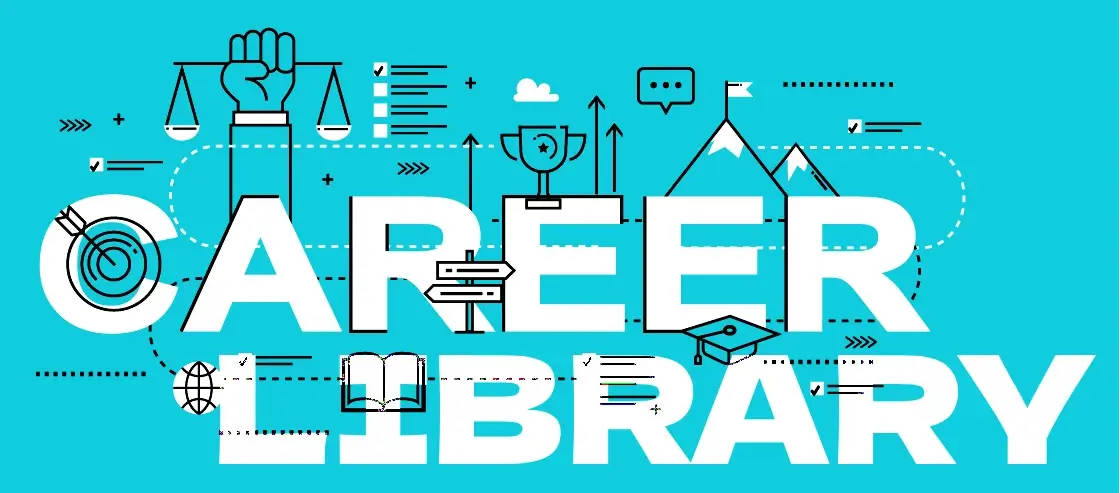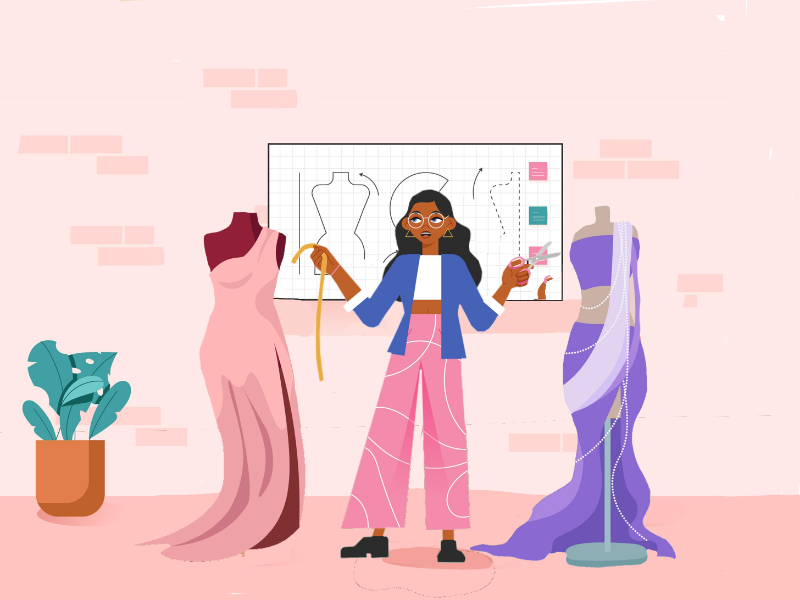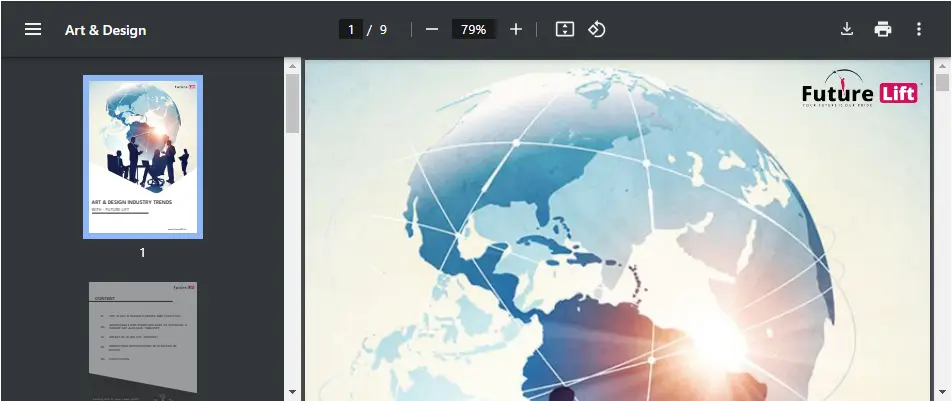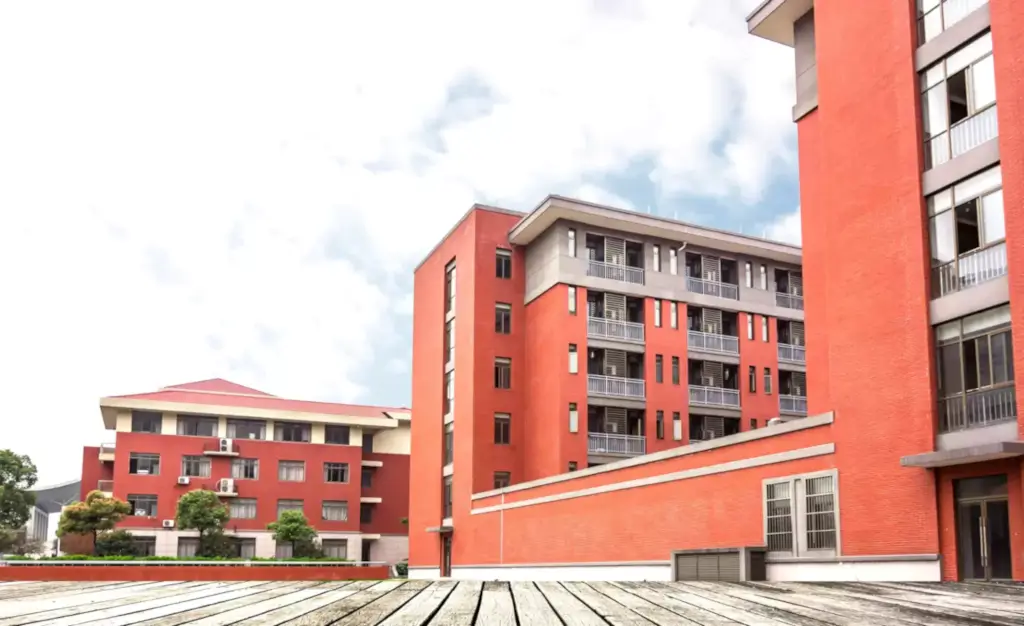
- Summary
- Opportunities
- Career Pathway
- Skills and Qualities
- Occupational Profiles
- Leading Institute
- Abroad Institute
- Entrance Exam
- Industry Trends
- Pros & Cons of a Career
Know what is best for you!
Take world class Assessment test Take world class Assessment test
Fashion Designer
 Summary
Summary
From daily wear to night suits and luxury wear, everything is designed by a fashion designer. They sketch designs, footwear and accessories and conceptualize different design styles to create original clothing. Fashion designers are the ones solely responsible for creating looks that we wear in our everyday lives. They handle everything from sketching, outsourcing, draping, etc. They don't just influence us but observe different trends and accordingly create and curate looks for the newest fashion trends.

 Career Opportunities
Career Opportunities
They are the face of the brand and represent the fashion houses and designers. They wear their clothes and accessories as they walk the ramp, do shoots, hold conferences, etc.
Write fashion-related blogs and promote content for a company or personal sites.
Conceptualize fashion ideas and sketch drawings to illustrate them through stenciling, and painting.
Write reports, critique fashion events, and new trends, follow through with upcoming brand collections.
Specifically design jewelry such as hairbands, bracelets, necklaces, anklets, etc.
Click photos of fashion shows, shoots, magazines, models and fashion accessories.
Manage retail stores, supervise employees, oversee sales, inventory, customers, etc.
Curate looks for others, provide fashion advice, and coordinate looks for celebrities, models, and actors for shoots, appearances, shows, etc.
 How to Pursue a Career
How to Pursue a Career
| Stream | Graduation | After Graduation | After Post Graduation | |
|---|---|---|---|---|
|
path 1
|
Science | B.F.Tech, B.Sc in Fashion Design | M.Sc Fashion Designing | - |
|
path 2
|
Commerce | B.F.Tech | M.Des | - |
|
path 3
|
Arts | B.F.Tech, B.Des | MA Fashion Design, M.Des | - |
 Skills and Qualities
Skills and Qualities
- Creative Flair: The ability to create new and fresh designs to cater to the public, and clients and keep up with the fashion trends.
- Eye for detail: This is extremely important as there is a heightened need for accuracy and no room for mistakes as that could severely affect the designer or brand’s image resulting in plummeting brand value.
- Market Idea: The ability to predict the trends in the market and understand the fluctuations in the fashion market to cater to the customers.
- Colour, Shade, and Texture Sensibility: The skill of knowing colours, shades, and textures to know which season asks for what and how to design clothes with colours and shades that work well with each other.
- Adaptability: The ability to adapt to the client’s style so that the designs can fit their vibe and closet.
- Design skills & knowledge: One would require a wide set of knowledge regarding different designs to create a variety of clothing styles without it getting monotonous.
 Occupational Profile
Occupational Profile
- Sketching Designs: Make drafts, visualise ideas, and put them down on paper to experiment with designs, patterns, etc.
- Researching Trends: Research previous trends and forecast future trends, gather data, work on statistics, etc.
- Concept Creation: Create mood boards, themes and drafts for upcoming collections. Put together abstract ideas and analyze the client’s taste to curate and coordinate according to their style.
- Supervising Production Process: Oversee the whole process of production from the prototypes to the final production.
- Budget Making: Make budgets for upcoming collections, shoots, changes in the brand, etc.
- Collaborating with Workers: Work together with the team, other designers, vendors, managers, as well as clients.
- Testing Materials: Try and test different fabrics, patterns, and colours to curate new looks.
 Leading Institute
Leading Institute
| University | Location | Website |
|---|---|---|
| National Institute of Fashion Technology (NIFT) | Plot no. 15, Sector 4, Kharghar, Navi Mumbai, Maharashtra 410210 | |
| Amity University | G8VM+H6F, Amity Rd, Sector 125, Noida, Uttar Pradesh 201301 | |
| Symbiosis Institute of Design | Lavale, Mulshi, Pune, Maharashtra 412115 |
 Abroad Institute
Abroad Institute
| College | Location | Website |
|---|---|---|
| Fashion Institute of Technology, New York | 227 W 27th St, New York, NY 10001, United States | |
| Parsons School of Fashion. New York | Parsons East, 25 E 13th St, New York, NY 10003, United States | |
| London College of Fashion, London | 105 Carpenters Rd, London E20 2AR, United Kingdom |
 Entrance Exam
Entrance Exam
| Exams | Tentative Date | Important Elements | Website |
|---|---|---|---|
| NIFT | 1st week of February | Drawing Skills, Creativity, Observation Skills, General Knowledge and English Comprehension | |
| NID | April-May | Analytical Reasoning, Design Aptitude, Drawing Skills, Creativity and Problem-Solving | |
| CEED | November | Arithmetic, Algebra, Creativity, Observation, General Knowledge, Logical Reasoning and Language |
 Pros & Cons of a Career
Pros & Cons of a Career
Pros:
- This field allows one to be creative and experiment with their vision and concepts.
- One can choose their work timings and keep their schedule flexible.
- The work culture is very dynamic and fast-paced giving individuals a constant push to do better.
- In this field, fame and prestige are often attached to the job and its position.
Cons:
- This work is highly stressful and can lead to health issues because of it.
- This field is highly competitive and requires a lot of energy.
- One will need to work late and overtime to meet the deadlines and keep the sponsors and clients happy.
- The work timings can stretch for hours and be very long and intense.
 Industry Trends
Industry Trends
- Genderless Fashion: With constant change, consumers are aiming for more gender-fluid clothing.
- Accessorizing: From chic minimalism, the trend has shifted to cool accessorizing. These accessories can vary from caps to berets and rings to bracelets.
- Social shopping: The choice of shopping outlets has changed from traditional shopping malls and more modern choices such as Amazon and Flipkart to social media such as Instagram, TikTok, etc.
- Sustainable fashion: Awareness of the growing pollution and its effect has resulted in customers growing more conscious regarding their fashion choices. People are discarding the idea of fast fashion, and opting for more sustainable choices.
- Diversity and Inclusivity: The world is becoming more inclusive and diverse, resulting in the inclusion of more diverse choices even in clothing and accessories. This includes sensitivity and respect towards other cultures, body types, and clothes of a larger variety.
- Tech Integration: Robotic integration results in faster production as well as the integration of AI during the process of designing.
- Smart fabrics: With the development of new technology, smart fabrics that react to stimuli are starting to replace conventional fabrics.
- Personalization: There is a growing trend for customized products, therefore fashion brands are starting to personalize clothing.
- Influencer marketing: With constant change, the fastest growing and the best marketing tactic is influencer marketing, especially in the fashion industry.
- Metaverse: The world is becoming more digital prone with traditional assets shifting to the digital world. Even the fashion world has taken this route and has started to release fashion-related NFTs.
 View PDF
View PDF



